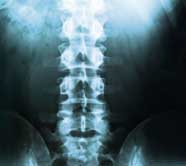Spinal Stenosis Treatment

Spinal stenosis treatment at Salem Hospital
Patients on Boston’s North Shore seeking spinal stenosis treatment will find world-class care at Salem Hospital, a member of Mass General Brigham. We offer exceptional back and spine specialist physicians and we can also refer patients to specialists at other hospitals within the Mass General Brigham network, including Massachusetts General Hospital and Brigham and Women’s Hospital.
Spinal stenosis is a condition where space within the spine is narrower than it should be, causing pressure on the spinal cord and/or nerve roots. Patients with spinal stenosis may experience numbness, weakness, cramping or general pain in the arms and legs. Severe spinal stenosis may result in problems with bowel and bladder function as well as foot disorders.
Non-surgical spinal stenosis treatment
- Nonsteroidal anti-inflammatory drugs (NSAIDs) such as aspirin, ibuprofen, naproxen or indomethacin
- Anesthetic injections, also called nerve blocks, near an affected nerve to help relieve pain.
- Restricted activity
- Corticosteroid and junctions to reduce inflammation and treat acute pain
- Analgesics, such as acetaminophen, for pain relief
- A brace to provide lumbar support
- Physical therapy and/or exercises to strengthen abdominal and back muscles, build endurance, and stabilize the spine.
Surgical spinal stenosis treatment
If a patient’s condition does not respond to medical spinal stenosis treatment, spine surgery may be recommended. Surgical spinal stenosis treatment options include:
- Decompressive laminectomy – surgery to remove, trim or adjust diseased parts of the spine to relieve pressure on the spinal cord or nerves.
- X-stop surgery – a minimally invasive back pain surgery where a device is inserted into the back of the spine to keep the patient from bending too far backward at the narrow segment of the spine.
Find a physician for spinal stenosis treatment
To find a physician who can offer spinal stenosis treatment, patients may get a referral through their primary care physician or use the Find a Doctor search on our website. You can search by name of physician or practice, by location, gender and languages spoken. To find a specialist in spinal stenosis treatment, select “spine surgery” under specialty.



